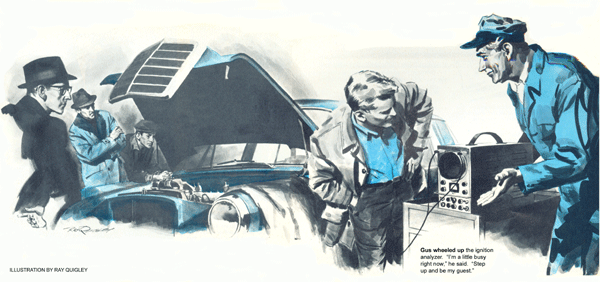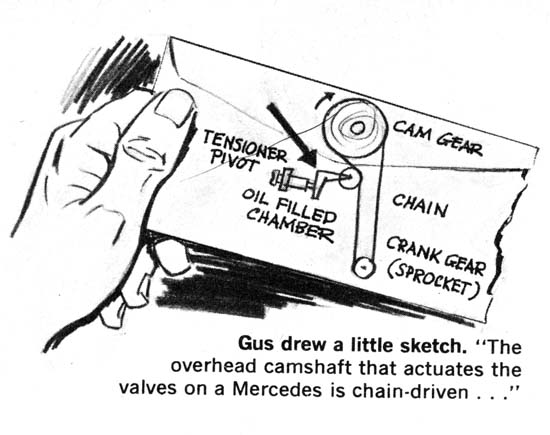March 1966
GUS GIVES THE TEACHER
A PASSING GRADE
by Martin Bunn
When it came to lending a hand
to the high-school car pool,
Gus was in a class by himself.

Gus Wilson stepped from the brilliant morning sunshine into the somewhat dimmer reaches of the Model Garage and stood still for a moment to let his eyes adapt. The morning sun was so pleasant he'd taken his time getting to work and Stan Hicks, his assistant, had already opened shop.
A flash of chrome and a slightly different hood shape caught Gus's eye and he walked down to a Mercedes-Benz sedan parked in the middle of the shop. The car, a four-cylinder Model 190, was not new, but it was obviously well cared for. There was a large cardboard sign on the windshield: "Do not start engine! Do not push in gear!"
Stan came out of the office holding a large and steaming crockery mug. "Coffee's ready, Gus." He pointed towards the Mercedes. "Some young fellow brought it in on the end of a tow rope. He seemed pretty much disturbed and said to just, please, leave it alone and he'd come back and see you as soon as he could."
Gus headed for the office and the coffeepot. The wait for the owner was a brief one. As Stan had said, he was a young man, rather soft-spoken, and clearly upset. His name, he said was Jim Bailey, and he was the mechanical-arts teacher over at the local high school.
"Here's the situation, Mr. Wilson," he said. "Three other teachers and I formed a pool to buy a car to drive to school. We all live in the same neighborhood. They teach English, Latin, and Music. They keep saying my class is a waste of time because kids can't learn enough to actually fix anything -- these days, anyway."
Gus raised his eyebrows. "Why not? Lots of good professional mechanics started in manual training or a mechanical-arts class. Besides, what's that got to do with the Mercedes?"
Bailey looked a little sheepish. "Well, I was the mechanical-minded one and I sort of persuaded them that we'd get good gas mileage if we bought this car, and that it was durable; and since the price was right we'd have a real bargain."
Gus put down his coffee cup and reached for his pipe. "So what's wrong with that?"
The young teacher grinned weakly. "Well, I told them that since there wasn't a Mercedes dealer within 40 miles, I'd take care of the mechanical work myself. I even bragged a little that if I couldn't take care of a little four-cylinder car I'd better quit trying to teach kids how to care for big eight-cylinder jobs."
Gus chuckled. "And now you've got trouble and you're out on a limb. It can't be too bad. What did you do?"
Bailey glanced at his watch. "Got to get back -- next class in 20 minutes. Actually, Mr. Wilson, all I did was change oil. I got up early this morning to do it. After putting in the new oil, I started the engine to back out of the garage and I noticed I didn't have any oil pressure."
"What did you do then?" asked Gus.
"Oh, I shut off the engine right away," said Bailey. "I was afraid I might score the cylinders or burn out the bearings."
Gus shook his head. "You probably didn't if you only ran it a few seconds."
Bailey looked glum. "I don't know. I'm afraid it's something bad. I lifted the hood and tried turning the crankshaft pulley with a little bar. She's blocked solid."
"You mean it won't turn at all?" said Gus.
Bailey gestured towards the car. "Try it. You can turn it okay part of a revolution and then she hits. I guess I'll just have to ask you to fix it. Right now, I've got to get to class." The worried teacher started for the door.
"Give me a minute of your time," said Gus, slipping into the car. He depressed the clutch and pushed the starter button. Nothing happened.
"Oh," recalled Bailey, "I disconnected the starter so nobody would turn it over accidentally and do more damage."
Gus tugged the hood-release handle. "Put the cable back on the battery."
Bailey connected and tightened the battery. Gus hit the button and the engine hummed smoothly into life. He let in the clutch, jumped the car across the garage floor, and braked hard. With the engine still running, he slid from the seat, slapped the astonished teacher on the back, and laughed.
"Okay, you can drive to school now -- there's nothing much wrong with your car. But come back later."
Stan had been a silent listener to the proceedings. "That took nerve," he said.
Gus was looking over the work schedule for the day, and merely grunted.
Stan went on: "I can understand how he might have had an air lock in the oil-pump pickup dome so he didn't build up oil pressure after the change; and I can see how a quick stop and start would slosh the oil in the pan enough to clear the air bubble but I don't understand why he felt a solid lock when he turned the crankshaft by hand and yet you started it without trouble."
Gus went on with his paperwork. "You're right about the air lock that kept the pump from priming," he said. "When Bailey comes back, I'll tell you about the crankshaft block."
Shortly before closing time, the snub-nosed Mercedes rolled back into the Model Garage. Bailey didn't seem quite so worried this time, but it was apparent that all was still not well. He listened to the story of the air-locked oil. Then Gus told him that what he'd felt blocking rotation was the pistons striking the valves because he'd been turning it backwards.
Stan evidently couldn't quite accept this. "Why wouldn't the pistons hit the valves any other time?" he asked.
Gus drew a little sketch on an envelope. "The overhead camshaft that actuates the valves on a Mercedes is chain-driven. The side of the chain that is pulling is always taut, like the top side of a bicycle chain when you're pumping. The back side is slack, like the bottom of a sloppy bicycle chain. An oil-filled chain tensioner rides against it to keep the chain in snug running contact with the sprockets.
"Mr. Bailey's tensioner is a little leaky and bled down some of its oil overnight. It didn't really pump up again in the few seconds' running before the lack of oil pressure scared him. Then, when he turned the engine, he turned it backwards; the slack side of the chain became the pulling side, and the crank throws were out of time with the camshaft by the amount of slack in the chain. Even a gentle contact between a piston and a valve is frightening when you expect an engine to turn freely. It's happened to me several times on a Mercedes and that's why I wasn't concerned about this one."
Bailey grinned. "I'd better get a new chain tensioner, right?"
"It's a good idea," said Gus.
As Bailey was about to leave he hesitated. "Actually," he said, "the fellows got after me a bit on the way home tonight. The car runs fine most of the time, but every now and then it starts to buck. Tonight it bucked and then died. I coasted out of traffic, looked over the distributor cap and rotor for cracks and such, put it back together, and it ran okay."
Gus reached through the window and yanked the hood latch. "Was the distributor dirty inside?" he asked.
Bailey grimaced. "After what I tell my students? No, sir, take a look. I rebuilt that distributor myself."
Gus had to admit that the little reddish-colored cap and the gleaming parts within looked like jewelry. He tore a piece of paper into a narrow strip and worked it between the points. The paper showed a trace of black as he released it from between the contact surfaces.
"What did you lubricate the advance mechanism with?" he asked.
Bailey fished in the trunk a minute and produced a tube. "This white lubricant that I use for almost all my fine work. Those advance parts are really slick and I just put a tiny smear on them."
Stan caught it right away. "I remember when we tried to use the same lubricant," he said. "It has a metal additive and seems to vaporize a bit when the engine gets hot. After a while an almost invisible film shorts out the rotor."
Gus ran the tip of his finger up the under-face of the rotor. "As the rotor spins, it acts as a centrifuge and a thin conductive film works out toward the contact tip," he said. "Eventually, it provides a flashover path between the contact and the shaft."
Bailey was chagrined. "Then, when I wiped the rotor to look for cracks, I removed the invisible film enough for the car to run. I'll wash out the distributor with cleaning solvent and blow it dry at the school shop. Next time, I'll stick to approved distributor lubricants."
Two nights later, the Mercedes pulled in again. One cylinder sounded as though it was missing badly. Three men got out of the car with Bailey. From his expression, he'd been given a rough time on his choice of car and his mechanical skills. Gus felt sorry for him as he related his further troubles.
"After I cleaned the distributor," Bailey explained, "I got my friends here to go in with me on a new set of plugs. It doesn't stop anymore, but now we've got a steady miss."
Gus took a quick look at the plugs. They were correct for the model and compression ratio of the car. Hoping that Bailey could come through, Gus wheeled up a cathode-ray ignition analyzer with a considerable flourish, tossed a protective blanket on the fender, and gestured openly in invitation.
"I'm a little busy, right now," he said, "but step up and be my guest on the scope."
Bailey picked up the wire leads. He handed one to a member of his group.
"Here, Bob, lend a hand," he said.
"What do I do with it?" asked Bob.
"Plug it in the wall socket," said Bailey dryly. He then quickly snapped the pickups on the engine and hit the starter. A green trace raced across the scope face and settled down to a rough, four-pip pattern. Bailey watched, stopped the engine, interchanged two wires on cap and plugs, and started the engine again. He let it run about 30 seconds. His friends watched in fascination.
"What's going on, Bailey?" asked one.
Bailey looked up and grinned. "For you, Latin teacher -- veni; vidi; vici." He tugged a plastic object from the end of a plug wire.
"I came; I saw; I conquered. Tomorrow, you eggheads are shelling out for some new spark-plug resistor connectors."
He reconnected the plug wire by twisting the conductor around the plug cap and started the engine.
"The rhythm certainly looks better, now," said the music teacher.
"From here on, let it be semper fidelis every morning," added the Latin teacher.
Bob assumed a dramatic manner. "Frankly, Bailey, your practical skills have always amazed us, but we feel our goading has driven you to new heights, as exemplified by your concert with this fabulously complex, green-eyed machine. The engine suddenly runs well."
Gus had been fairly sure the scope was understandable to the teacher from his reading, if not from experience. He'd also been sure the device would impress the others.
"Bad resistor connector?" he asked, winking at Bailey.
Bailey could also be an actor. He winked back. "Yeah, high KVs on number four. You run into it now and then on these foreign ignition systems."
END
